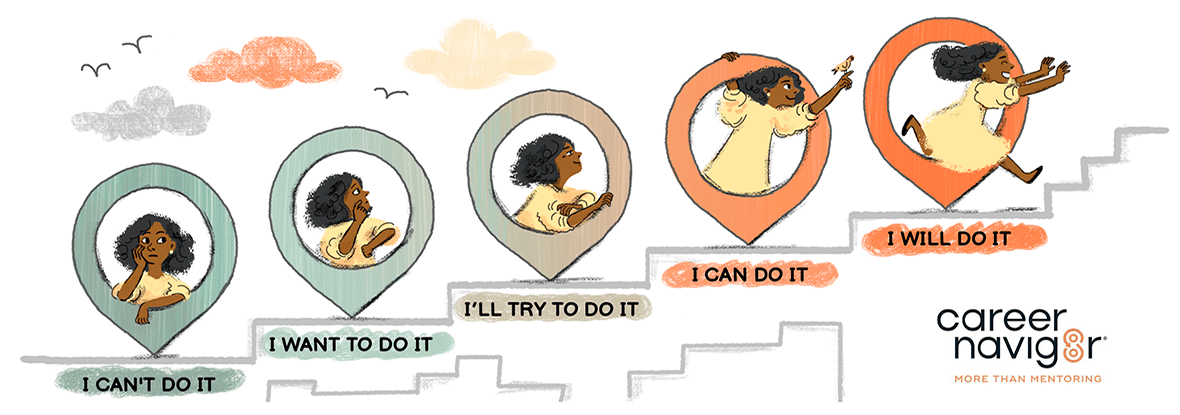How to Improve Confidence at Work in 5 Steps

Confidence at work is a game-changer. It boosts your performance, drives results, and helps you grow in your career.
While developing confidence can feel like doing splits (you felt the pain, didn’t you 😂), it isn’t as difficult. Not with the help of a confidence mentor. In this blog, learn how you can be confident at work and measure your progress with a professional confidence mentor.
Why Confidence at Work is Crucial
Because it drives your communication, decisions, and productivity. Here’s how:
Assertive Communication
People can sense the conviction in your voice. When you talk confidently, you not only make your point but are understood and respected. It’s called assertive communication.
Assertive communication refers to expressing your thoughts, ideas and opinions while respecting the people you’re talking with. When you communicate clearly and confidently, you reduce the unnecessary back and forth and make your conversations less stressful. You get things done.
Improved Decision-making
You make decisions at work every day – from sending an email to deciding the budget for a team outing. While a lack of confidence can lead to what-ifs and buts, building confidence encourages you to overcome decision paralysis and keep growing.
A confident mindset enhances the quality of the choices you make. When you believe in your abilities, you’re empowered, resilient, and willing to take calculated risks. Like midlife careers changes.
Enhanced Productivity
It’s all about taking that first step. Staying in your comfort zone sounds easy and cosy. But if you want to forge ahead, you have to step out of it and stop procrastinating.
When you’re confident, the fear of failure diminishes. You spur into action, take charge, and improve your productivity. This positively impacts your motivation and helps you check things off your list. Which in turn creates a feedback loop – ‘I did this yesterday, I can do it again’. Confidence turns your thoughts into actions. Like we said, it’s all about taking that first step.
How to Measure Confidence at Work
No, we’re not talking about 20 ounces of confidence or 30 metres of it. Measuring confidence at work depends on what you think about yourself. How self-aware you are and how you deal with the feedback you receive.
Self Awareness
The first step is understanding your strengths, values and opportunities to improve. The more you know about yourself, the better you can measure your confidence.
Say you’re a non-tech professional who wants to break into IT. Instead of being daunted and obsessing over how difficult it’ll be, analyse your existing skill set to develop a strategic plan. What are your transferable skills that apply to IT? Maybe you’ve managed projects, dealt with numbers, or led teams. Are there courses or industry certifications that you could take to fill the knowledge gaps? Can someone in your network introduce you to IT recruiters and leaders?
Results Achieved
Yet another measure of your work confidence is in the results you achieve. For example, you may have an excellent idea to promote the new software. But are you confident enough to speak about it? Do you trust your abilities and your ideas to drive results?
Whether you apply to a new role, sign a new client, or sit in a team meeting, people want to see results. They want to know how you perform in your role and what steps you take to deal with challenges. They’re not just a list of tasks you completed – they’re milestones that reflect your confidence in yourself. Previously achieved results, kind words, and testimonials can help build confidence. 😃
Feedback
Have you ever been told that you’re shy at work? That you need to speak up more and advocate for yourself? Do you let others steer the conversation because you feel hesitant to voice your concerns?
Sometimes, your colleagues and clients may encourage you to come out of your shell. Use this feedback for confidence building. Take a mental note of what prompted them to say that and how you can work on it – yes, take it in your stride!
5 Steps to Become More Confident at Work

Confidence is a skill like any other that you can improve with practice. Here are 5 tips that could help you be more confident at your work:
Embrace Challenges
What initially seems intimidating can be a learning and growth opportunity. Like learning how to swim, drive or cook. Take on challenges at work that lie outside your usual routine. Embrace the discomfort and overcome your fears. This helps you push boundaries, become adaptable and build confidence in your abilities.
Learning and Training
Being knowledgeable in your industry and role contributes to a sense of self-assurance. The more you learn, the more equipped you feel to handle the challenges that come your way. Learning a new skill helps you grow as a professional, stay informed about industry trends, and instil confidence in your abilities.
Body Language
Think of a superhero and their body language. They stand tall, remain calm and collected, and look confident. Now, who said you couldn’t be your own superhero? Your body language and confidence go hand-in-hand. You can start with your posture (and say goodbye to back and neck pains). Speak slowly and clearly, and make eye contact. Helps people know that you feel confident in what you’re talking about.
Practice and Repeat
What’s the one thing that you being good at your work and Spiderman using his webbing to hang upside down have in common? Practice. The more you repeat and practice a craft, the better you become at it and the more confident you feel. So if you’ve got a presentation next week, practise it. Got a sales pitch meeting? Come up with answers to common objections and practices. Want to get better at a new programming language? Practise.
Celebrate Wins
A win can be sending a cold pitch email one day and closing a major client the other. Whatever your win is, celebrate it. Acknowledge your success. Want to take it a step further? Maintain a running document of your wins at work, however big or small. Write how you contributed to it and the results you drove. This can help you assess your own skills and share your progress with your mentor.
Could You Benefit from a Professional Confidence Mentor?
In one word – yes.
A confidence mentor helps you identify the areas for improvement and suggests strategies tailored specifically to you. They’re your soft skills mentors who hold you accountable for your goals and help you understand how to get the best out of yourself.
Improving your confidence helps you professionally and personally. Clear communication, improved decision-making, and faith in yourself can reduce stress levels. It also enriches your relationships and your sense of self-esteem. According to research conducted by psychologists at the University of California, Davis, and the University of Bern, high self-esteem leads to more success at work and better mental and physical health.
Remember how you’d check your height as a kid against a mark on the wall or how high you could reach the upper shelf in the kitchen? And how happy you’d get when you realised you were indeed getting taller? 😄
When you’re working on your confidence, having a supporter and a guide can be helpful to measure and celebrate your progress. A confidence mentor is all this and more rolled into one.
So if your grandma has no idea why learning inheritance concepts in C++ is a big deal, don’t worry. Your mentor will understand that win. 🥳
Find a Mentor Today
Career Navig8r connects you with experienced mentors who want to help you succeed. They can help you improve confidence at work and offer much-needed support. To find a navig8r today, sign up with Career Navig8r and contact mentors who know what it’s like to be in your shoes. Have faith in yourself – we believe in you!


